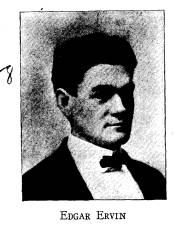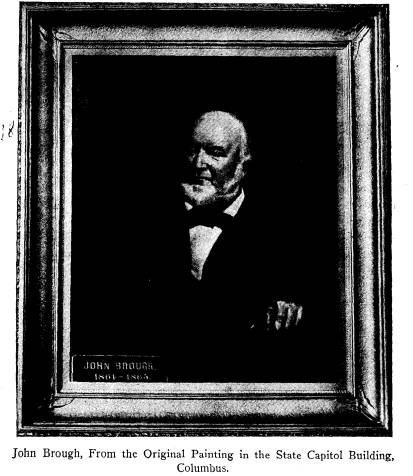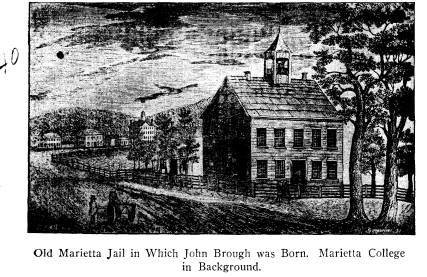Ohio History Journal
|
BIRTHPLACE OF JOHN BROUGH.
EDGAR ERVIN. [The following article clears up the disputed question concerning the birthplace of John Brough, one of Ohio's famous war governors. It also presents many interesting events in the life of the governor. Mr. Edgar Ervin, the writer, is the present member of the Ohio House of Repre- sentatives from Meigs county. Mr. Ervin was educated in the country schools, subsequently receiving special training for public life in the Capitol School of Oratory (Columbus), Lakeside Summer School, King's School of Oratory (Pittsburg), and the College of Law, Ohio State University. He was admitted to the bar by the Supreme Court of Ohio in June, 1906, while serving as a member of the 77th General Assembly. - EDITOR.] The wrecking of the old jail just opposite the Court House in Marietta, brings to mind several historic facts of no mean importance. This building was a little more than fifty years old, |
|
|
|
the building, which was very strongly built and from which, it is stated, no prisoner ever escaped. The jury room was in the rear of the second story over the jail. A cupola surmounted the roof in which was hung the same bell that was hung in the (105) |
106 Ohio Arch. and Hist.
Society Publications.
succeeding Court House and which has
been in use till the
occupancy of the present new Court
House.
The theory that John Brough was born in
the primitive
Court House has been disputed for the
reason that, coupled with
the above statement, the assertion is
generally made that his father
was Sheriff at the time. We quote from a
Marietta newspaper
issued Friday, June 12, 1863:
"Mr. Brough (John) was born in 1811
in Marietta, in the
old Court House and jail, the
dwelling-house part of which was
occupied by his father, John Brough,
Esq., who was at the time
Sheriff of the county. The father was a
native of England, and
died in 1823, on the 'Cleona' farm just above the mouth of Duck
Creek."
In the issue of Friday, Sept. 11, 1863,
appear nearly the
same statements:
"John Brough was born in 1811, in
the dwelling-house part
of the old jail, John Brough, Esq.,
being Sheriff at the time.
His father was a native of England, and
died in 1823, on the
'Cleona' farm, and within a short time
'Jack' went to learn the
printer's trade with the late Roal
Prentiss in the office of the
American Friend, then being only about
twelve years of age."
From the "History of
Marietta," by Thos. J. Summers, we
note the names of Sheriffs since 1788:
1788, September, to 1802, Ebenezer
Sproat.
1802, September, to 1803,
William Skinner.
1803, September, to 1810, John Clark.
1810, September, to 1812, William
Skinner.
1812, September, to 1814, Timothy Buell.
It is readily seen that John Brough's
father was never
Sheriff of Washington county. Then what
about the authen-
ticity of the article?
If wrong in one particular, then is it
wrong in all? Of
course, one will readily admit that it
was possible for the elder
Brough to occupy the dwelling-house part
of the old Court
House, and yet not be Sheriff. But why
should he ever live
in the building, since the records show
that he neither was
Sheriff nor Deputy Sheriff at the time
of the birth of John
Brough, Jr.?
|
Birthplace of John Brough. 107 In searching the old records in the office of the Clerk of Courts, we find the following order on page 184: "Journal of Common Pleas Court of Washington County, |
|
|
|
December 17, 1810. Ordered that license be granted to John Brough (Senior) to keep a tavern in the Court House. (Signed) PAUL FEARING, Presiding Judge." |
108
Ohio Arch. and Hist. Society Publications.
On page 253 of the same, volume, under
date of Dec. 14,
1811,
we find where the license is renewed:
"Ordered that the license be issued
to John Brough to keep
tavern under the Court House." This is self explanatory and it
becomes an established fact that John
Brough, the "War Gov-
ernor," was born in the old pioneer
Court House, and this
place will doubtless soon be marked with
a monument erected by
the Ohio Historical Society.
JOHN BROUGH.
There came to Ohio the family of John
Brough, Sr., from
Maryland, who settled in the valley of
the Little Muskingum in
Washington county. It was here that John
Brough, the eminent
war governor of Ohio was born in 1811.
Brough was a born
executive; strong in physique, resolute
of countenance, he pos-
sessed that thorough-goingness and
accurate execution which
characterized his administration as
governor of Ohio. His type
was that representative of a strong and
determined will, and it is
in this particular that he distinguished
himself in early life in
College at Athens, in the field of
journalism and in the governor's
chair.
Brough attended the Marietta schools,
and in early life,
like Ben Franklin, was apprenticed as a
printer. It was his ex-
perience in the print shop that gave him
such a comprehensive
view of human nature and many facts here
acquired by his ab-
sorbent mind, gave him a stock of
information which stood
copious draughts during his future
career. He was not a
theorist; his clear logic, apt
perception, and open and frank dis-
position, moved him to apply promptly
and well his new acquisi-
tion of knowledge. While a student at
the University his work
was characterized by zealous effort and
diligent research. He
worked in the office of the Mirror during
his leisure hours and
thus defrayed his expenses. He was a
great athlete, and while
at Athens, tradition has it that he
accomplished his greatest feat
by kicking a football over the main
building.
Birthplace of John Brough. 109
AS A JOURNALIST.
Brough's executive ability coupled with
his natural instinct
for the printing business, made him an
ideal newspaper man of
his day. At twenty years of age we find
him editing the Western
Republican at Marietta. His maiden issue appeared on the birth-
day of General Jackson in 1831, Jackson
being his political idol
at that time. After two years he, with
his brother, bought the
Ohio Eagle at Lancaster. This paper made him a political
leader of the state. He entered
politics, but retained his con-
nection with the Eagle, and
reported for the Ohio Statesman at
Columbus until 1841, when the Brough
brothers bought the
Cincinnati Advertiser and changed its name to the Enquirer.
The paper continued in his hands until
1848. Brough was much
censured by the press at this period; he
was criticised politically,
attacked personally, and abused
maliciously, but he always
claimed to act on the defensive, and
never apologized for the
keenness of sarcasm often resorted to in
these conflicts. A hu-
morous incident is told concerning a
brief article which ap-
peared in the Louisville
Courier-Journal, then edited by G. D.
Prentice, while Brough was editing the Enquirer.
Prentice was
having some fun by thus describing his
immense avoirdupois:
"If flesh is grass as people say
Then Jackie Brough's a load of
hay."
Brough, having in mind the numerous
criticisms of the
press replied, "That he supposed he
was hay judging from the
number of asses that were nibbling at
him."
PLACE IN HISTORY.
Brough made his formal entry into
politics in 1835, when
he was elected Clerk of the Ohio Senate.
Robert Lucas was
then governor. Thomas Ewing represented
the state in the
national senate, while in the house of
representatives at Wash-
ington, Thomas Corwin was becoming
popular. Andrew Jack-
son as president had begun his war on
the U. S. Bank, while
Thomas Benton, Martin Van Buren, W. H.
Harrison, Daniel
Webster, John Calhoun and Henry Clay were
among the leaders
|
110 Ohio Arch. and Hist. Society Publications.
in national politics. On the slavery question Brough was con- servative. This was the period when the Abolitionists referred to the national constitution as a "league with hell and a covenant with death." Brough's position is clearly outlined in his speeches. During the progress of the war, Brough made a stir- ring speech at Marietta, calling on all loyal citizens regardless of party affiliations, to uphold the administration of Lincoln and suppress the war, concluding as follows: "This country, my friends, is the last hope of freeman throughout the world. It is the field upon which civilization has |
|
|
|
flourished and science began to accomplish its great purpose. The nations and people of the old world are marking its prog- ress from day to day as it enfranchises man from every servitude. And are you going to give it up? Young men can you afford to give your posterity a heritage worse than that which your fathers gave to you? If you can, you are faithless, not only to your own manhood, but to your God. You are bound to have one country, one flag and one destiny. And what country shall this be? What but the country you had before the rebellion raised its |
Birthplace of John Brough. 111
parricidal hand to strike it down. That
country with the incubus
of slavery wiped away; a country that,
like a weary man who has
lain down by the roadside to rest, has
risen again, and is marching
on to its great destiny. What flag, but
that which smiles on our
peaceful assemblage today. Stand by it
then, let it be the flag
of the Union restored, reared aloft to
float forever. Or, when it
falls, if fall it must, let there be
nothing around it but crumbling
walls and nothing above it but the Angel
that shall speak the end
of time and the beginning of
eternity."
BROUGH AND VALLANDIGHAM.
Brough, as candidate, managed his own
campaign, and de-
livered many speeches in his telling
sledgehammer style. Val-
landigham, his opponent, having been
arrested and sent within
the Confederate lines, was forced to
rely on his friends to look
after his interests. The campaign was fierce; men, women and
children attending the public meetings
and indulging in heated
discussions, and many times in personal
combat. All felt relieved
when the campaign closed. An interesting
incident is related
concerning Vallandigham while being
conducted through the
Confederate lines. The escort had been
traveling almost day
and night, and after having spent the
greater part of the previous
night on the march worn and weary, the
party stopped for a few
hours sleep. Vallandigham was called at daybreak and told
that day was appearing and that they
must resume their journey,
at which he raised himself on his elbow
and said in a dramatic
manner:
"Night's candles are burnt out and
jocund day
Stands tiptoe on misty mountain
tops."
Here he hesitated; the next line
describes the wrathful
feelings of the soldiers for him and
comes consecutively in the
poem:
"I must be gone and live or stay
and die."
Brough was elected governor by the
greatest majority ever
given a candidate at that time and
during his official career ex-
hibited many of the highest qualities of
statesmanship.


